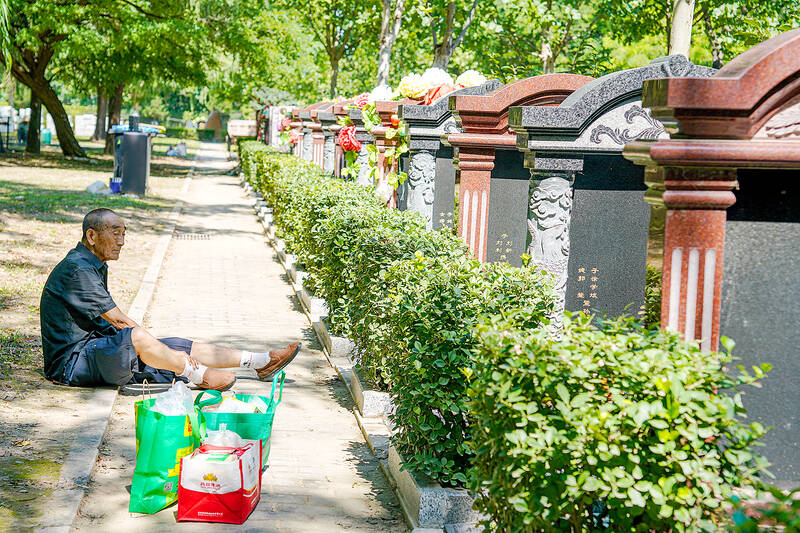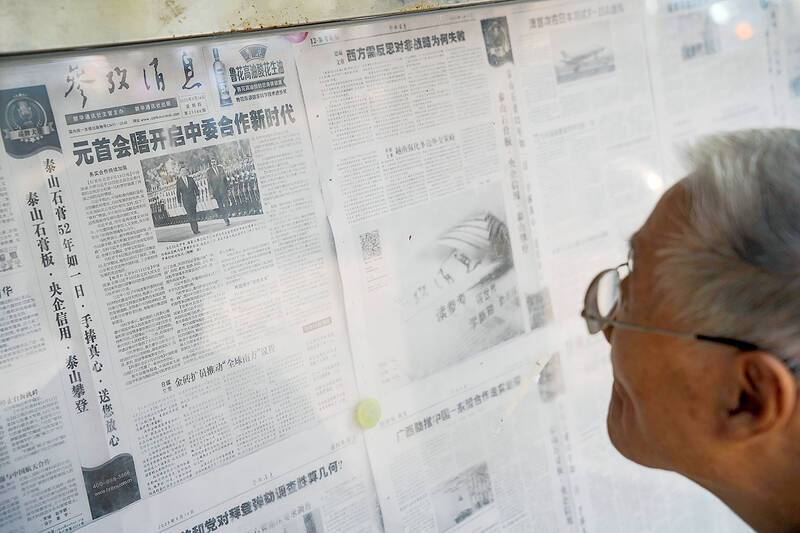Cici, 27, doesn’t want to have a baby until she’s at least 35. Her mother is putting pressure on her to get married and “have a stable life,” but with a busy job at a tech company in Beijing — while also completing a master’s degree in law — she hardly has the time to think about starting a family.
Cici’s story is not unique; across the world, young women are putting off marriage and childbirth for longer than their mothers did. However, in China the phenomenon is so acute that last year the population shrank by 850,000, the first decline in more than 50 years, as the birthrate fell to a record low.
As the population contracts, its makeup is changing in a way that portends serious problems for China’s economy.

Photo: EPA-EFE
Cici’s predicament might be familiar to millennials in many wealthy countries, but China cannot yet count itself among that rarefied group. The World Bank defines a high income country as one in which the gross national income per person is more than US$13,845. Although China’s income per person has skyrocketed in the 21st century, in 2022 it had only reached US$12,850. Many economists now fear that China will get old before it gets rich.
AGEING COUNTRY, FALLING BIRTHRATE
Comparisons are being made between China and Japan, which entered a gloomy economic period in the early 1990s. The trigger for what became known as Japan’s “lost decades” of deflation and stubbornly low growth was a stock market crash, but it was exacerbated by the country’s ageing population.

Photo: EPA-EFE
About 14 percent of China’s population is now over 65, a threshold that Japan passed in 1993. But while it took Japan nearly a decade to reach that level from 10 percent, China made the jump in just six years. In the next two decades, China is on track to add more over-65s to its population, than the US has people.
The government is well aware of these problems. In 2016, it abandoned the decades-old one child policy, replacing it with what is now a three child limit. Some provinces have abandoned restrictions
on family-sizes altogether, one of a raft of measures to encourage women to have more babies. Other policies include up to 30 days of paid holiday for newlyweds, discounts on IVF and cash subsidies for second and third babies.

Photo: AP
These incentives have made little difference. China now has a generation of young women like Cici who are more educated than their parents and are unwilling to adhere to patriarchal norms around family planning, despite official exhortations.
Last year, after unveiling a politburo that excluded women for the first time in 25 years, Beijing passed an amendment to China’s gender law that called on women to “respect and obey … family values.” Since then online feminist groups that call on women to reject marriage and procreation have been shut down.
IT DOESN’T ADD UP
Cici says she just wants to reach “career stability” before starting a family. Her and her boyfriend need to save up to two million yuan (US$270,000) to buy a property in Beijing, where average prices in July were 70,740 yuan (US$9,500) a square meter, according to a data provider.
As long as young people like Cici feel like the sums don’t add up on having children, China’s workforce will continue to shrink. Between 2019 and last year, the number of people of working age declined by more than 40 million, making supporting the growing ranks of elderly people increasingly difficult.
In 2019, government thinktank the Chinese Academy of Social Sciences, warned that the main state pension fund could run out of money by 2035. That was before the massive slowdown of the past few years, which hit pension contributions. As an emergency relief measure during the pandemic, the government allowed companies to pause social security contributions for up to six months. This saved businesses 1.54 trillion yuan, but also hit revenues for pension funds by 13 percent, sending the system into deficit for the first time.
The pensions deficit may be a temporary problem, says Zoe Zongyuan Liu, a fellow at thinktanks the Council on Foreign Relations, but “with the shrinking population it becomes very difficult to increase the pension base, therefore you have to increase your investment. The Chinese government has been developing different programs to allow pensions to invest in different varieties of assets to increase investment returns … but it really depends on how the economy goes.”
“If the economy is not doing well, if investments are not doing well, and the government continues to cut contribution rates,” then the deficit problem will worsen, Liu says.
The fact that China has one of the lowest retirement ages in the world does not help matters. Men can retire at 60, while for women it is 55, or 50 for blue collar workers. Suggestions about raising the age have prompted public outcry.
This year state media said that Beijing was pushing ahead with plans to raise the age, without specifying when this would happen. But needs must, and wherever China’s famously bottle black leaders look, they are finding grey hairs that threaten to derail the economy.

On April 26, The Lancet published a letter from two doctors at Taichung-based China Medical University Hospital (CMUH) warning that “Taiwan’s Health Care System is on the Brink of Collapse.” The authors said that “Years of policy inaction and mismanagement of resources have led to the National Health Insurance system operating under unsustainable conditions.” The pushback was immediate. Errors in the paper were quickly identified and publicized, to discredit the authors (the hospital apologized). CNA reported that CMUH said the letter described Taiwan in 2021 as having 62 nurses per 10,000 people, when the correct number was 78 nurses per 10,000

As Donald Trump’s executive order in March led to the shuttering of Voice of America (VOA) — the global broadcaster whose roots date back to the fight against Nazi propaganda — he quickly attracted support from figures not used to aligning themselves with any US administration. Trump had ordered the US Agency for Global Media, the federal agency that funds VOA and other groups promoting independent journalism overseas, to be “eliminated to the maximum extent consistent with applicable law.” The decision suddenly halted programming in 49 languages to more than 425 million people. In Moscow, Margarita Simonyan, the hardline editor-in-chief of the

Six weeks before I embarked on a research mission in Kyoto, I was sitting alone at a bar counter in Melbourne. Next to me, a woman was bragging loudly to a friend: She, too, was heading to Kyoto, I quickly discerned. Except her trip was in four months. And she’d just pulled an all-nighter booking restaurant reservations. As I snooped on the conversation, I broke out in a sweat, panicking because I’d yet to secure a single table. Then I remembered: Eating well in Japan is absolutely not something to lose sleep over. It’s true that the best-known institutions book up faster

Though the total area of Penghu isn’t that large, exploring all of it — including its numerous outlying islands — could easily take a couple of weeks. The most remote township accessible by road from Magong City (馬公市) is Siyu (西嶼鄉), and this place alone deserves at least two days to fully appreciate. Whether it’s beaches, architecture, museums, snacks, sunrises or sunsets that attract you, Siyu has something for everyone. Though only 5km from Magong by sea, no ferry service currently exists and it must be reached by a long circuitous route around the main island of Penghu, with the